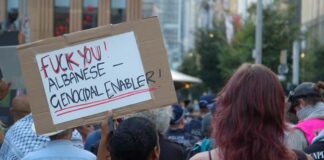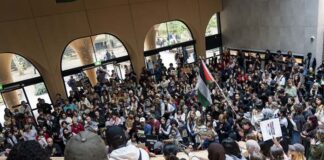The assault on Gaza is part of the wider US-backed “war on terror” across the Middle East. Ending the Australian government’s continued backing for US wars in Iraq and Afghanistan is part of building the kind of struggle needed to free Palestine.
Israel’s murderous assault on Gaza has, once again, been willingly backed by the US. The US has given Israel diplomatic cover by blocking resolutions in the United Nations Security Council calling for a ceasefire.
Israel is the key US ally in the Middle East. Its army is, in effect, an extension of the US military due to massive US military aid. This is set at $3 billion a year for the next decade—the most received by any single country.
US support allows Israel to maintain one of the world’s most advanced military arsenals. It is armed with state of the art F15 and F16 bombers, Apache attack helicopters, tanks and nuclear weapons. The US has promised to allow Israel to maintain a “qualitative edge” in military technology over the rest of the Middle East.
Since 2001 Israel has been a key player in the US “war on terror”. The US’s real aim was summed up by Condoleezza Rice’s talk of a “new Middle East”—one where US control was absolute.
But the wars in Afghanistan and Iraq have failed to cement US authority. The resistance there have dragged the military superpower into a deep quagmire, with the likelihood of humiliating military defeats.
In the face of the US debacle in Iraq, it looked to Israel in 2006 to try to regain the initiative in the region with its war on Lebanon.
They hoped that wiping out Hezbollah would weaken other opponents of US power such as Iran and Syria. But, as in Iraq, resistance fighters brought the invaders to a standstill. Hezbollah fighters delivered Israel its first military defeat since its foundation.
The current assault on Gaza is widely seen as an attempt by Israel to reassert its military strength. Military experts say the Israeli army is now better trained, and many other “lessons” have been drawn from their failure in Lebanon.
Australia’s role
Many people were shocked when acting Prime Minister Julia Gillard blamed Hamas for the Israeli rampage. Parroting the White House she claimed, “the act of aggression was engaged in by Hamas… That is what breached the ceasefire, and Israel responded.”
Despite positioning itself against the Iraq war, the new Rudd government is just as solidly behind the US alliance as John Howard was.
Speaking in Washington in March last year, Kevin Rudd declared, “My view of the US’s role in international affairs is simple: I believe the US is an overwhelming force for good in the world.”
Although it has withdrawn 550 Australian combat troops from Iraq, 1000 military personnel remain in non-combat roles.
In Afghanistan a further 1000 Australian troops are playing a frontline role in military operations, pushing into areas controlled by resistance fighters. Eight Australian soldiers have been killed there, seven of them in the last year and a half.
Breaking the Australian government from the US coalition would have a real impact. The US and Israel are increasingly isolated on the world stage. The US is finding it hard to get support from other allies in sending troops to Afghanistan and Iraq.
Australia is one of its few firm supporters. An Australian withdrawal from the “war on terror” would pressure other countries to also end their support.
This means demanding an end to Australian diplomatic and military ties with Israel, and an end to the Australian government’s support given by speaking out in defence of Israeli military action.
But the best way we can weaken the imperialist project in the Middle East is to force our government to stop propping up the US occupations in Afghanistan and Iraq by getting Australian troops out.
If the US is forced to quit Iraq and Afghanistan, it will encourage resistance to imperialism across the Middle East and be a blow to Israel’s attempt to isolate Palestinian resistance.





